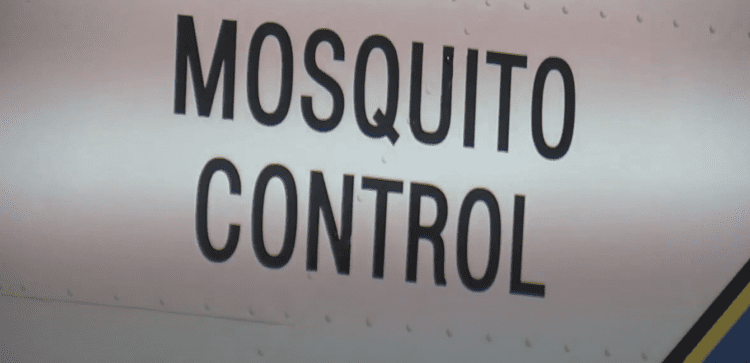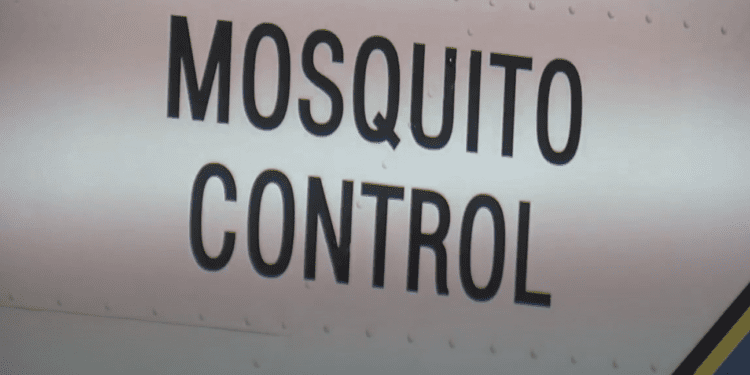
Photo: WCIV video about beekeepers warning of risk from mosquito control efforts in South Carolina
(WCIV) — When mosquitoes start swarming, its a sign the Lowcountry’s waters have been stirred up.
Tropical Storm Debby stirred things up significantly, causing a call for increased mosquito control measures, but spraying for mosquitoes is a double edged sword when it could potentially put critical pollinators at risk.
“When we have a flood, such as what happened with Hurricane Debby, about a week to two weeks later, we start to get significant increases in mosquito populations,” said Clemson University’sapiculture and pollinator specialist, Ben Powell.
He says that during that period is when mosquito control programs swoop in to fight back.
“What most mosquito control programs are doing is they’re monitoring the mosquito populations. They’re also monitoring diseases that the mosquitoes can transmit to determine if the mosquito populations are getting bad, and if there are diseases within that population. And when the two things combine, they have to act pretty aggressively to knock down the mosquito populations following these hurricanes and flood events,” Powell said.
If they don’t act, it poses a threat.According to Powell, the largest mass casualty events that have happened in the southeast have all been mosquito related disease outbreaks.
But with these sprays, its not just mosquitoes that feel the sting, essential pollinators could be impacted too. With that being said, South Carolina beekeepers will want to be on high alert this week.
Mosquito control programs across the state will be taking flight with aerial sprays and while these operations target mosquitoes, they could also catch bees in the crossfire.
Powell says the first step for beekeepers is simple: contact your local mosquito program and make yourself known.
“If they don’t know you’re there, they can’t work around you or with you. They can’t provide you any specific notifications. So if you’re going to keep bees in an area that’s has a mosquito abatement program, you need to contact them directly,” Powell said.
Powell then urges the honey farmers to find out when and where the sprays will take place.
“These counties have a spray map, and they’re going to identify parts of the county that they will be doing their applications in on certain days, and if you know the day that they’re going to be treating your part of the county, then you could screen your bees in,” Powell said.
Even though the pesticide doses sprayed from the planes are small, Powell says they can still pose a risk.
“When insects are flying, they generate a little bit of a static charge, which makes them kind of like little magnets as they fly through the air, so the spray as it’s descending through the air will actually be attracted to flying insects, especially small bodied flying insects,” Powell said.
He also says that the good news is that, as soon as the pesticide makes contact with a surface or insect, it no longer becomes active. This means beekeepers can take action to protect their hives.
Powell stresses that while the threat to a colony isn’t zero, it’s relatively low.
“If you know the day that they’re going to treat, then you can screen your bees into the hive, prevent the foragers from coming out and getting exposure, and that will minimize impact to the colony,” Powell said.
Powell says their Department of Pesticide Regulation enforces state pesticide laws and they receive very few if not zero investigations of bee kills each year.
He then told a story shared among the beekeeping community.
“There was an intensive effort to knock down mosquitoes in the Dorchester County area, and there was an accusation by a commercial beekeeper in that area that they lost numbers of hives due to the application that went to an investigation. And the department of pesticide regulation investigated and determined that the applicator did everything within the law so that there was no legal repercussion,” Powell said.
Powell says everyone can take part in minimizing mosquito populations.
“The little ones that breed in our human habits, they’re the bad ones. They’re the ones that carry most of the diseases. So if you can eliminate their breeding sites, you’re going to do wonders to help both human health as well as all of our pollinators and beneficial insects out there. So help us try to mitigate these flood waters, reduce the breeding habitats in and around your areas, and you will be helping beekeepers across the state,” Powell said.
He says its imperative both the applicators and beekeepers take measures to minimize exposure.
“They are critical components of our environment, and they provide essential ecosystem services, everything from maintaining forest and water quality, soil and so forth. So we don’t want to kill all the insects around us. They provide beneficial services,” Powell said.
Jim Strohm, president of the state beekeepers association, gave suggestions for what people should do to prepare for the pesticide sprays.
“What we can do, though, is temporarily while they are spraying, we can cover them with wet sheets for a short duration the hives. Cover the hives with short with wet sheets for short duration to protect them from flying while the spray is being applied. Overnight. It’s not an issue. We can uncover them after the spray is diluted after a while, and release the bees. But what I want to do is mainly let the beekeepers know so individually they can. They can prep their hives when they’re going to be sprayed.” Strohm said.
If your looking to learn more about mosquito control programs, visit DHEC’s mosquito page.
Source link : http://www.bing.com/news/apiclick.aspx?ref=FexRss&aid=&tid=66ccd5ff67ea4bb2ac3ce50ae2fb8a76&url=https%3A%2F%2Fwww.abccolumbia.com%2F2024%2F08%2F26%2Fbeekeepers-warned-of-risk-from-mosquito-control-efforts-in-south-carolina%2F&c=6264470820784677363&mkt=en-us
Author :
Publish date : 2024-08-26 05:50:00
Copyright for syndicated content belongs to the linked Source.




